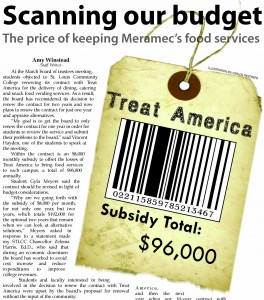The price of keeping Meramec’s food services
By: Amy Winstead
– Staff Writer –
At the March board of trustees meeting, students objected to St. Louis Community College renewing its contract with Treat America for the delivery of dining, catering and snack food vending services. As a result, the board has reconsidered its decision to renew the contract for two years and now plans to renew the contract for just one year and appraise alternatives.
“My goal is to get the board to only renew the contract for one year in order for students to review the service and submit their problems to the board,” said Vincent Hayden, one of the students to speak at the meeting.
Within the contract is an $8,000 monthly subsidy to offset the losses of Treat America to bring food services to each campus, a total of $96,000 annually.
Student Gyla Meyers said the contract should be revised in light of budget considerations.
“Why are we going forth with the subsidy of $8,000 per month, for not only one year, but two years, which totals $192,000 for the optional two years that remain when we can look at alternative solutions,” Meyers asked in response to a statement made my STLCC Chancellor Zelema Harris, Ed.D., who said that during an economic downturn the board has worked to avoid cost increase and reduce expenditures to improve college revenues.
Students and faculty interested in being involved in the decision to renew the contract with Treat America were upset by the board’s proposal for renewal without the input of the community.
“We were told that there will be a committee that will make a decision and we were informed by SGC that the board decided to renew the contract for another two years,” said Vidyullata Waghulde, Ph.D., a chemistry professor and co-adviser for the international club.
Objections to the contract include the cost of lunch in the cafeteria.
“When a meal in the cafeteria costs almost $10 when the school is subsidizing them at a rate of $8,000 a month, something is wrong,” Hayden said.
Christy Hart, the liaison between the school and Treat America, said it is not possible to provide campus dining services without a subsidy.
“We have to subsidize Treat America if we want to the quality, quantity and variety unless there is a drastic reduction to only grill service and grab-and-go,” Hart said.
According to Hart, there are only a few major companies such as Treat America, Sodexho and Aramark for school food services, and with the limited business on a two-year campus, the subsidy is necessary to attract a contract for dinning and catering services.
“It is very different from a four-year campus where you have students who live on campus and the demand for food services is higher,” Hart said.
One possibility for eliminating the subsidy is to give beverage vending rights to a dinning and catering company.
“The plan is to renew the contract for one year with Treat America, and then the next year when our 10-year contract with
Coke expires we can look at which is the best combo of food and vending and offset a subsidy by giving a company pouring rights,” Hart said.
The subsidy is not the only issue and some think that the quality of the food is poor. Some students and faculty agree that for the Meramec campus, healthier and cheaper choices are off campus.
“It’s an easy choice to go somewhere else,” Hayden said. “The quality of the food is often not that great either and none too healthy.”
Meyers suggested that a different type of company such as Subway or another franchise could be contracted instead of Treat America. Hart responded that such an idea is not feasible.
“You cannot compare walk-up to fast food. There is not enough business to support a franchise fast food service either… It is difficult to meet the needs of a community that requires stables for the students, healthy choices, and catering services that range from box lunches to fundraising banquets,” Hart said.
While the contract requires that clubs must use Treat America’s catering services, some student clubs would prefer to order from off campus.
“The international club should be able to get food from outside sources because with Treat America the quality of ethnic food is none excitant. Also, if we were to order from them, we will spend our entire funds in two meals,” said Marco Romero, Spanish professor and co-adviser for the international club.
If student clubs are granted permission to get food from off campus, they must pay a 15 percent fee to Treat America.
“If the money that is spent on the food comes from what students earn, by doing activities on campus, then I think it is not fair to pay the 15 percent penalty. I think clubs should be exempted from going through Treat America,” Waghulde said.
When Phi Theta Kappa held a faculty luncheon last year, they spent $3,000 on a pasta bar and surveys collected afterward criticized the quality of the food. This year, the luncheon was still prepared by Treat America, but the menu was changed in response to the criticism of last year.
“The last thing we really want to spend the money we do have on is food, so when a company charges a lot of money for food, we expect quality and often we don’t get it,” Hayden said.
According to Hart, the food cost is on the national average.
“Catering supports walk-up and the prices for catering are reasonable. Included in the cost of the food is the delivery and service of plates, napkins, drinks and tables clothes. A group could order food to be delivered but there will not be the Sternos to keep it warm,” Hart said.
In response to the concerns about student club spending, Hart said that Treat America has considered the possibility of a discount for clubs in a new contract.
“Maybe a different accommodation is possible for student clubs,” Hart said.
Although the money that pays for Treat America is separate from the funds that pay for student services such as child care and athletics, Meyers said those services are more significant to student needs than Treat America.
“I can go elsewhere to eat for a lot less. Unlike the situation of child care, I can’t send my children to another preschool cheaper, therefore I ask where the board’s priorities are,” Meyers said. “Child care and athletics are much more serving in regards to academic achievement and outcomes than a cafeteria.”











